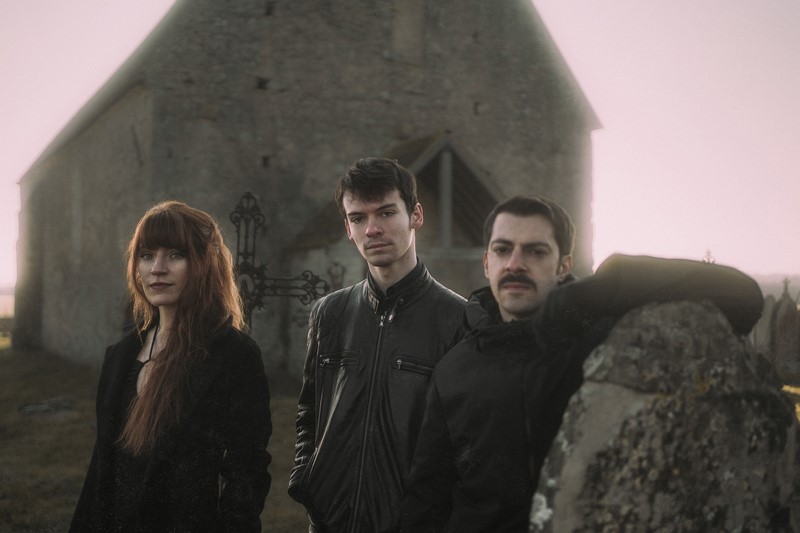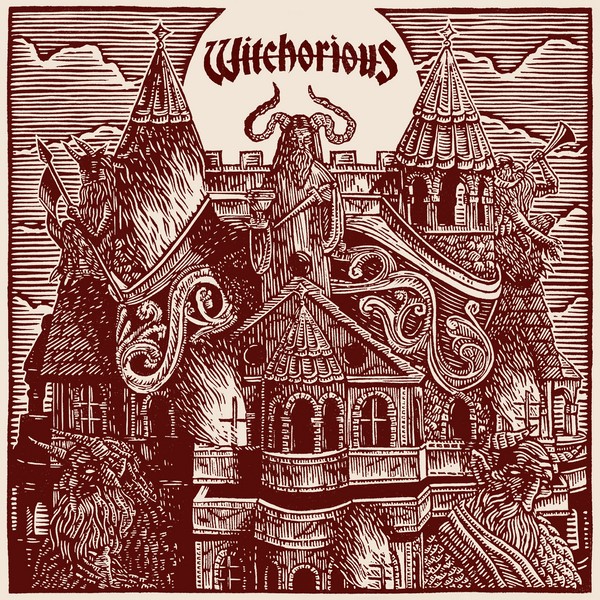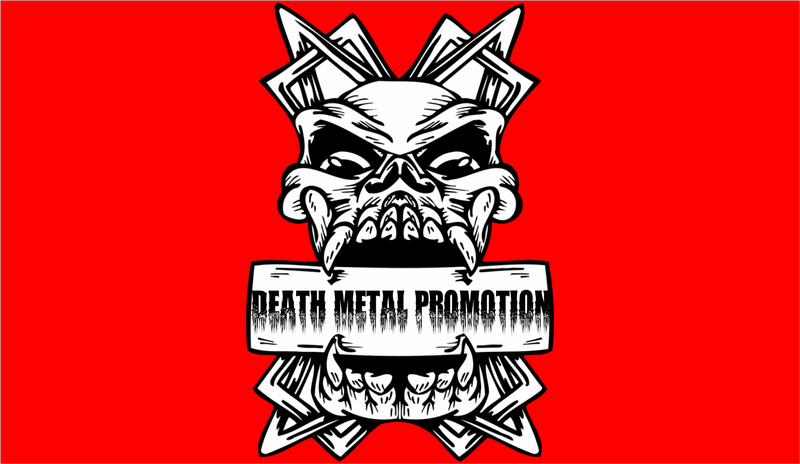 “3 AM” and “Evil Creature” were your first singles, released in 2020. How has your sound evolved since then, and what can listeners expect from your debut album?
“3 AM” and “Evil Creature” were your first singles, released in 2020. How has your sound evolved since then, and what can listeners expect from your debut album?
Well, four years have passed since we released our first two singles, and I think we can say that we have become more violent since then. These singles were really the basis of our sound and influences, very Black Sabbathish raw doom metal. As time went by, we kept this love for doom, but started to incorporate many other influences, from black metal to nu metal. We have worked a lot on more efficient riffs and structures, but I think that the real difference lies in the vocals: I started to scream on most songs, and Lucie started to really sing as well. She even leads the vocals on “Eternal Night”. So if you like classic doom riffs, occult atmosphere, and the energy of more extreme metal blended with male and female harmonies, this album is for you!
What draws you to doom metal, both musically and thematically?
We’ve always loved the aesthetic. We love the way it sounds, with raw and acid guitars, organic drums, and mysterious vocals. We’ve always felt good in this kind of dark but not too dark ambiance, in which you can play with occult symbols… Looks wicked, doesn’t it? And we are kind of dark too. I mean, we’re just regular people, but there are so many times when we feel sad and life is just hard… We wanted to talk about our dark issues, and doom seemed to be the perfect ground for that.
Could you share some insights into the creative process behind “Witchorious”? Any particular challenges or breakthrough moments you encountered during its creation?
Yes, the idea at the beginning was to create a 4-5 song EP. But with Covid and the extra time we’ve had, we extended the writing process and made an album. We wanted to be completely free to develop each theme, play with the riffs in all the variations, experiment intros and outros… The first songs we wrote (“Why”, “Blood”, “Watch Me Die”) are very much about societal issues through a narrative, while the last ones (“Monster”, “Catharsis”, “To The Grave”) are more introspective, a lot about my inner conflicts. One of the challenges on these last songs was to deliver myself completely in the lyrics without sounding like a boring therapy. Some of the songs have had several versions, like “To The Grave”. It was a bit stressful at times because I knew what I wanted to say in these songs, but couldn’t find the right way to put it… But luckily, I eventually found something that I was satisfied with. It is sometimes hard to keep it straight to the point. Also when we were almost done writing the album, we felt like we were missing a strong and efficient song to summarize the whole album, with the style we came to at the end of the process. This is when I wrote the riff and lyrics of “Monster”, quite quickly. We liked it, worked on it, and could finally use “Monster” as the lead single for the album.
Can you tell us about some memorable moments from your live shows?
In November 2023, we opened Westill Fest in the west of France. We were the starting band, nobody knew us, and we were a bit stressed out, so we didn’t know what to expect. We went for it all the way, and after the first song the audience was already very welcoming, with a lot of applause. I dared to look at the room after three songs and saw it was quite crowded. We were so happy and honored to participate in this festival. There was also a gig at the end of the year in our hometown where people were really happy to see and support us, and it was funny to have this feeling to be back home and share our songs with family. Thank you people for being so nice to us!
How do you approach songwriting to convey such complex ideas within the context of your music?
I’d say that like everybody, we have our deep issues, and we need to take them out. We are quiet people, even a bit shy. Music has always been a good way to let go. So we first talk and agree on the type of ambiance or message we want to deliver, then work on riffs, and try to make it meaningful together, with dynamics and effects. The lyrics are so important. I write most of the lyrics, but Lucie writes some too. We always try to be as genuine as possible, like when you have the courage to say something honest to somebody else. For me, especially on very personal songs, writing them is like writing a diary that I then share to the world.
Paris is known for its rich cultural heritage. How does the city influence your music and artistic expression?
I think that growing up in a town where there are so many gothic monuments, cathedrals, catacombs, has always sort of made me feel like I was living in the horror/vampire movies I loved so much. And this is almost true for all of France: we have so many churches and medieval castles I am so interested in, it is so old and still here, I think it really shaped the way I think about the world looking at the past. Catholic symbols are very present, and it always made me think about the opposite Satanic ones. I don’t believe in God, but I feel great in churches, because I like the greatness of the place and how it makes you feel safe to take time to think. Look at buildings like Notre-Dame or Sacré-Cœur, people had to be so faithful and devoted to create them, while humanity could have focused on something else… I really think these are big reasons for my taste for the occult, which is so fascinating to me, and that you can logically find in our music.
How did the Studio Sainte-Marthe environment contribute to shaping the sound of the record?
This studio is so cool. There is so much gear, from drums to amps and effect racks… And above all, the boss and producer Francis Caste makes it magic. He really took the time to understand our project and made us feel comfortable immediately. He would just light up some ambient lights to set an occult atmosphere, ask questions and propose a ton of relevant ideas. Then we would try so many things on the sound and songs, and finally choose what we preferred, what we all felt was best for the songs. He really had the best ideas to help us make the record haunted, make the most of each song, and make it sound as a whole. There were also moments when he would continue working on the noises around the songs after we left the studio, and would show us the result the following morning. Of course, each time it was the exact noise you needed, and he didn’t always say what he used. As good as confidential, haha.
How do you incorporate visual elements into your live performances and album artwork to enhance the overall experience for your audience?
It may be surprising but we had the artwork finalized very early, before writing most songs. We asked Vaderetro Studio to create something around a sick old city ruled by evil forces, with several occult symbols, because it was a summary of the metaphors we wanted to use in the album. So we already had an idea of the topics we wanted to explore, and actually this artwork was a great inspiration for the songs we were writing. Visuals are really part of the artistic proposition of the album. Now, regarding our live performances, we do not go this far yet. We have worked on our outfits, and evolved from classy Parisian rocker shirts to shiny black garments with symbolic necklaces, more prone to a black mass. We are thinking about integrating objects on stage to reinforce the atmosphere, and at some point we’ll add a wonderful backdrop.
What are your hopes and expectations for “Witchorious” reception by both existing fans and new listeners?
First, we hope that people like it just because they think it sounds good and like listening to it. I think this is the starting point to addiction to any band you could listen to. Then, we hope that many people will be able to identify with our music, whether it be through the lyrics that talk about things they can relate to, or through our mix of old school doom and more modern metal. More pragmatically, we hope that this album will show the stoner/doom community that we exist and that they will see our identity, what we sound like and what we have to say, and that people who discover us will be eager to see us live.
What do you see as the defining characteristics of modern doom metal, and how do you push the boundaries of the genre with your own sound?
I think modern doom metal is a music that preserves the codes of doom, with dark heavy riffs, slow mid-tempo songs, bewitching vocals and lyrics, but with a more modern sound on the instruments, touches of techniques from more recent genres, and lyrics that talk about nowadays issues. I don’t think there is any clear recipe or definition actually, it just needs to both feel doom and reflect what you are living, not be a museum of ancient times. I think this is what we are doing, using this monumental doom metal legacy and incorporating elements from new music and culture we’ve loved until now so that it sounds like us, like we feel. After all, we do not claim to radically transform doom, which would be lying, but to do our best to shape our identity.
How do you navigate the balance between personal introspection and creating a relatable experience for your audience?
We do not really pay attention to that. We just try to be as sincere as possible, to tell these things as we honestly feel them. Since we talk about issues that many people experience, and this is generally why it becomes interesting to make a song out of it, I am pretty confident that some people will identify.
How do you aim to connect with your audience on an emotional level through your music?
With the album, I would say we wish to connect through the melodies, lyrics, and atmosphere. We hope our listeners will feel safe in this occult place we built, and will ramble with us through their thoughts, pains, frustrations… Hopefully, they will feel better after listening to the record. Regarding live shows, we try to install dynamics to create gloomy and trippy atmospheres that are then smashed by moments of pure violence. We hope they can fully feel the energy, and that they enjoy themselves at our shows.
As a band from Paris, how do you perceive the doom metal scene in France, and how do you see Witchorious fitting into that landscape?
The doom metal scene in France is small but very active. It is very related to the stoner scene which is really bigger and full of passionate people. There are many great bands, from very traditional doomsters to more sludgy ones, and we hope we can have our space in that landscape. So far, we are welcomed very well by both fans and bands, so I hope we’ll grow a lot from this and will be able to develop our identity, which is a bit in the middle of everybody since we alternate between clean and screaming, trippy and violent tones.
Beyond music, what other forms of art or sources of inspiration influence the creative direction of Witchorious?
We draw a lot of inspiration from movies, especially horror ones, but not only. For instance, our characters in “Blood” and “The Witch” are much inspired by Stannis Baratheon and Melisandre in the series Games of Thrones. A lot of our musical imagery has been influenced by classic movies like “Evil Dead” or “Martyrs”. I am also very interested in relationships between people depending on their social backgrounds or place in the hierarchy, between the rich and the poor… I can be inspired by simple situations in life, like at work, or documentaries or again movies. I remember that movies like “Parasite” made me think a lot when writing lyrics for “Monster”.
What’s next for WITCHORIOUS?
In 2024, we are going to focus on gigs. We want to play everywhere and as much as we can, to meet our audience and present our music. I think we will start writing new songs very soon, and will probably think about a second album when time comes. But for now, let’s play!
If you really would like to support Antichrist, you can just Share our article.
You can also support Antichrist by sending a couple bucks to cover some webhosting expenses. =>> PayPal



